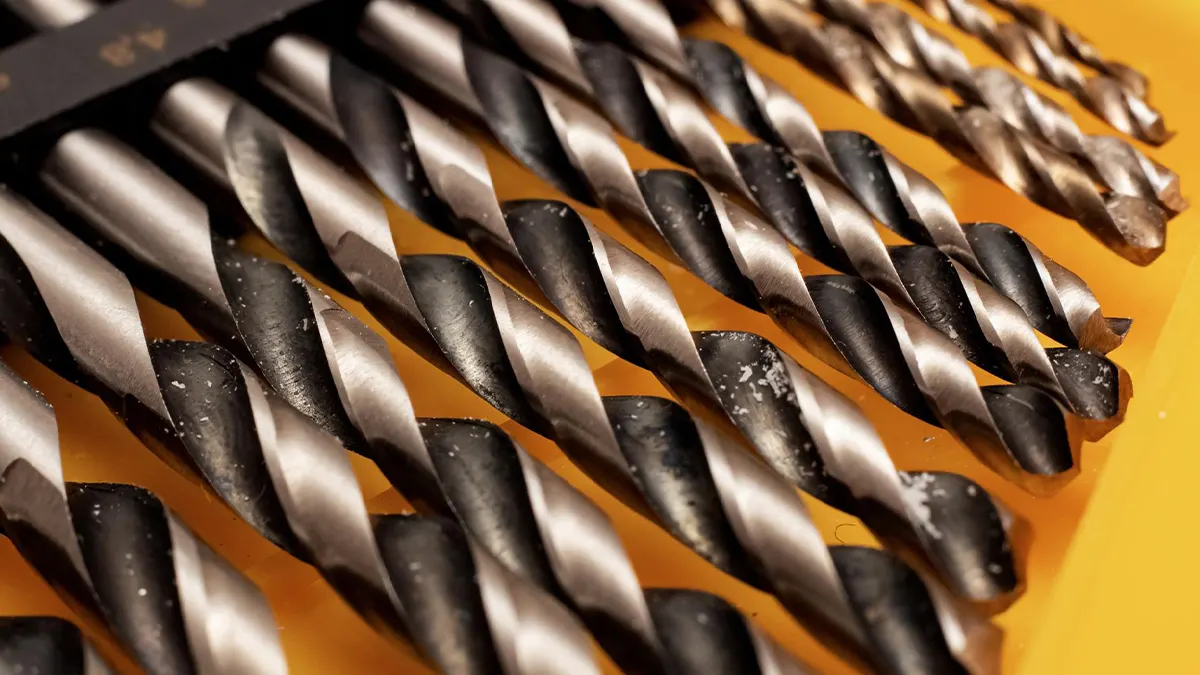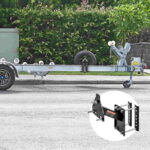What Are Drill Bits Sets?
Drill bit sets are collections of drill bit sets designed for various drilling applications. A typical set includes an assortment of drill bits sets in different sizes, materials, and styles to accommodate a wide range of tasks and materials. These sets offer convenience and versatility, allowing users to tackle multiple projects without needing to purchase individual bits separately.
Drill bit sets commonly include twist bits for drilling into wood, metal, and plastic materials. They may also feature masonry bits for drilling into concrete, brick, and stone. Some sets incorporate specialized bits like step bits for creating holes in thin materials or hole saws for cutting larger circular openings.
The drill bits sets within a set are typically organized and stored in a durable case or pouch, making them easy to transport and keep organized. This convenience factor is particularly useful for professionals, such as contractors, electricians, and plumbers, who frequently work on job sites or move between locations.
Table of Contents
Materials and Construction
Drill bit are typically made from high-quality steel alloys or solid carbide materials designed for strength, hardness, and heat resistance. The most common materials used in drill bit construction include:
High-Speed Steel (HSS): An alloy of iron, carbon, chromium, and other elements like molybdenum and vanadium. HSS bits are strong, durable, and resistant to heat and abrasion, making them suitable for drilling into wood, plastic, and soft metals.
Carbon Steel: A more affordable option made by adding carbon to steel. Carbon steel bits are suitable for basic drilling tasks in wood and soft materials but may dull more quickly than HSS or carbide bits.
Cobalt Steel: An HSS alloy with added cobalt for increased heat and wear resistance. Cobalt steel bits excel at drilling through harder materials like stainless steel and cast iron but are more expensive.
Solid Carbide: Extremely hard and wear-resistant bits made from tungsten carbide or other carbide materials. Solid carbide bits are ideal for drilling through the toughest materials like hardened steel, masonry, and concrete but can be brittle.
The manufacturing process also plays a role in drill bit durability and performance. High-quality bits are often precision-ground and heat-treated to enhance hardness, strength, and edge retention. Coatings like titanium nitride or diamond can further improve wear resistance and reduce friction.
Sizing and Measurements
Drill bits come in a range of sizes to accommodate different projects and materials. Understanding drill bit sizing and measurements is crucial for selecting the right bit for the job and ensuring proper fit and performance.
The most common way to measure drill bits sets is by their diameter, which is typically expressed in fractions of an inch or millimeters. Standard drill bit sizes range from 1/16 inch (1.6 mm) to 1 inch (25.4 mm), with increments of 1/64 inch (0.4 mm) or 0.5 mm. Larger drill bits, often used for specialized applications like hole saws or core drills, can exceed 1 inch in diameter.
In addition to the drill bit diameter, it’s essential to consider the shank size, which refers to the diameter of the non-cutting portion of the bit that fits into the drill chuck. Common shank sizes include 1/4 inch (6.35 mm), 3/8 inch (9.5 mm), and 1/2 inch (12.7 mm). Ensuring a proper fit between the shank and the drill chuck is crucial for secure bit retention and accurate drilling.
Other important dimensions to consider include the overall length of the drill bit, the length of the cutting edges (flutes), and the point angle. These measurements can vary depending on the intended application and the material being drilled.
When measuring drill bits sets, it’s essential to use precise tools like calipers or micrometer gauges to ensure accurate readings. Proper measurement is crucial for selecting the right drill bit size, avoiding damage to the workpiece or the drill, and achieving the desired hole size and depth.
Drill Bit Coatings
Drill bit coatings are thin layers of material applied to the surface of drill bits sets to enhance their performance and durability. The primary purpose of these coatings is to reduce friction, prevent wear, and improve heat dissipation during drilling operations. Common coating materials include titanium nitride (TiN), titanium aluminum nitride (TiAlN), and diamond-like carbon (DLC).
Titanium nitride (TiN) coatings are golden in color and provide excellent lubrication, reducing friction and heat buildup. This coating is highly resistant to abrasion and wear, extending the lifespan of drill bits, especially when working with tough materials like stainless steel or cast iron.
Titanium aluminum nitride (TiAlN) coatings offer superior hardness and oxidation resistance compared to TiN. These coatings are dark gray or black in color and can withstand higher temperatures without compromising their performance, making them ideal for demanding applications and high-speed drilling.
Diamond-like carbon (DLC) coatings are known for their exceptional hardness and low friction properties. These coatings mimic the properties of natural diamond, providing excellent wear resistance and lubrication. DLC coatings are often used in applications where high precision and longer tool life are required.
Coated drill bits offer several benefits over their uncoated counterparts. They can drill faster and more efficiently, reducing the risk of overheating and bit failure. Coated bits also require less frequent sharpening or replacement, resulting in cost savings and increased productivity. Additionally, the reduced friction and improved lubrication provided by coatings can lead to cleaner and more precise holes, enhancing the overall quality of the drilling operation.
Types of Drill Bits
Drill bits come in a variety of types, each designed for specific materials and applications. Here are some of the most common types of drill bits and their uses:
Twist Bits: These are the most common and versatile drill bits, suitable for drilling into wood, plastic, and soft metals. Twist bits have a spiral groove that helps remove chips and debris as you drill. They come in different tip angles, with 118° being the standard for wood and plastic, and 135° for metals.
Masonry Bits: As the name suggests, these bits are designed for drilling into concrete, brick, and other masonry materials. They have a tungsten carbide or diamond tip that can withstand the abrasive nature of masonry. Masonry bits often have an “X” or crosscut pattern to help remove dust and debris.
Brad Point Bits: These bits have a sharp bradpoint protruding from the center, which helps prevent the bit from wandering when starting a hole. Brad point bits are ideal for clean, precise holes in wood, preventing surface splintering and tear-out.
Auger Bits: Long, robust bits designed for boring deep holes in wood, such as for plumbing or electrical work. Auger bits have a screw-like thread that helps pull the bit into the material and clear out chips and debris.
Hole Saws: These are circular, drill-mounted saw blades used for cutting large holes in wood, drywall, or thin metal. Hole saws come in various diameters and have teeth on the circumference for cutting the material.
Step Bits: Also known as unibit or cone bits, these have a conical shape with increasing diameters along the length. Step bits can drill holes of various sizes in metal, wood, or plastic, making them versatile for various projects.
Spade Bits: Featuring a flat blade shape, spade bits are designed for quickly boring large, rough holes in wood. They are often used for creating holes for pipes, conduits, or other rough openings.
Understanding the different types of drill bits and their intended uses can help ensure you have the right tools for your project and achieve the best results.
Choosing the Right Drill Bit Set
Selecting the right drill bit set is crucial for ensuring your projects are completed efficiently and effectively. There are several factors to consider when choosing a drill bit set to match your specific needs and materials.
Factors to Consider:
- Project Type: Determine the types of projects you’ll be working on, such as woodworking, metalworking, masonry, or general household tasks. Different materials require specific drill bit types and coatings for optimal performance.
- Materials: Evaluate the materials you’ll be drilling into, such as wood, metal, plastic, concrete, or tile. Certain drill bits are designed to handle specific materials better than others, ensuring cleaner holes and longer bit life.
- Hole Size Range: Consider the range of hole sizes you’ll need to drill. Look for sets that offer a comprehensive selection of bit sizes to accommodate various project requirements.
- Bit Quality: Invest in high-quality drill bits from reputable manufacturers. Premium bits are often made from harder materials, have better coatings, and are designed for longer life and improved performance.
- Bit Quantity: Determine how many bits you’ll need based on the frequency and variety of your projects. Larger sets offer more versatility, but smaller sets may be more cost-effective if you have limited needs.
Matching Drill Bits to Projects and Materials:
- For woodworking projects, brad point bits, Forstner bits, and spade bits are excellent choices for clean, precise holes in wood.
- For metalworking, high-speed steel (HSS) bits or cobalt bits with titanium nitride coatings are recommended for drilling through various metals.
- For masonry work, such as drilling into concrete or brick, you’ll need specialized masonry bits or hammer drill bits designed for impact drilling.
- For general household tasks involving plastics, soft metals, or wood, a basic set of HSS bits may suffice.
Reading Reviews:
Before purchasing a drill bit set, read reviews from other users to gain insights into the set’s performance, durability, and value. Look for reviews that address the specific materials and projects you plan to tackle. Reputable reviews can help you make an informed decision and avoid subpar products.
Remember, investing in a high-quality drill bit set tailored to your needs can save you time, effort, and money in the long run by ensuring efficient and precise drilling across various projects and materials.
Using Drill Bit Sets Safely
Drill bits can pose significant safety risks if not used properly. It’s crucial to take the necessary precautions to avoid injuries and ensure a safe working environment. Firstly, always wear appropriate personal protective equipment (PPE) when operating drill bits, including safety glasses or goggles to protect your eyes from flying debris, and sturdy gloves to protect your hands from sharp edges and heat.
Before using a drill bit set, inspect each bit for any signs of wear, cracks, or damage. Damaged bits can break during use, posing a serious hazard. Ensure that the drill bit is securely fastened in the chuck of the drill, and double-check that the chuck key has been removed before turning on the drill.
When drilling, maintain a firm grip on the drill and keep your body balanced. Apply steady pressure and let the drill bit do the work; avoid forcing it, as this can cause the bit to bind or break. If the bit becomes stuck, stop the drill immediately and carefully remove the bit using appropriate tools.
Always unplug or remove the battery from the drill when changing bits or making any adjustments. This simple step can prevent accidental starts and potential injuries. Additionally, keep the work area clean and free from clutter, as a cluttered workspace can increase the risk of tripping or falling.
When working with drill bit sets, it’s essential to follow the manufacturer’s instructions and recommendations for safe operation, maintenance, and storage. By prioritizing safety and following proper techniques, you can minimize the risks associated with using drill bit sets and ensure a productive and injury-free working experience.
Caring for Drill Bits
Proper care and maintenance are crucial for extending the lifespan of your drill bit sets and ensuring optimal performance. Here are some tips for caring for your drill bits:
Cleaning
Keeping your drill bits clean is essential to prevent buildup and ensure accurate drilling. After each use, wipe the bits with a clean cloth to remove any debris, wood shavings, or metal filings. For more thorough cleaning, you can use a wire brush or a degreasing solvent to remove stubborn residue.
Storage
Store your drill bits in a designated case or pouch to protect them from moisture, dust, and physical damage. Avoid throwing them loosely into a toolbox, as this can cause the bits to become dull or damaged. Some drill bit sets come with a sturdy case or index that helps organize and protect the bits.
Avoiding Breakage
Drill bits are susceptible to breakage, especially when subjected to excessive force or used on unsuitable materials. Always follow the manufacturer’s recommendations for the maximum RPM and feed rate. Additionally, ensure that the bit is securely fastened in the chuck and that the workpiece is properly clamped or secured.
When to Replace Bits
Even with proper care and maintenance, drill bits will eventually wear down and need to be replaced. Signs that a drill bit needs to be replaced include excessive wear on the cutting edges, chipping or cracking, and a loss of sharpness or cutting efficiency. Dull or damaged bits can cause excessive heat buildup, leading to potential workpiece damage or safety hazards.
Popular Drill Bit Set Brands
When it comes to drill bit sets, there are numerous brands to choose from, each offering varying levels of quality and performance. Understanding the reputation and specialties of different manufacturers can help you make an informed decision based on your specific needs and budget.
Some of the top manufacturers in the industry include:
DeWalt: Known for their professional-grade tools, DeWalt offers a wide range of drill bit sets designed for heavy-duty use. Their bits are made from high-quality materials and feature advanced coatings for enhanced durability and performance.
Bosch: Bosch is another reputable brand that produces reliable and long-lasting drill bit sets. Their offerings cater to both professional contractors and DIY enthusiasts, with a focus on precision and efficiency.
Makita: Makita is a well-respected name in the power tool industry, and their drill bit sets are no exception. They offer a variety of options suitable for various applications, from woodworking to metalworking.
Milwaukee: Milwaukee is known for its innovative and durable tools, including their drill bit sets. Their bits are designed to withstand tough job site conditions and deliver consistent performance.
Irwin: Irwin is a trusted brand for affordable yet reliable drill bit sets. Their products are popular among DIYers and hobbyists, offering a good balance between quality and value.
When choosing a drill bit set brand, it’s essential to consider your specific requirements and the intended use. Professional contractors and tradespeople often opt for premium brands like DeWalt, Bosch, or Makita, which offer superior durability and performance but come at a higher price point. DIY enthusiasts and homeowners may find more budget-friendly options from brands like Irwin or the DIY lines of premium manufacturers suitable for their needs.
It’s also worth noting that some brands specialize in certain types of drill bits or materials, so consider the materials you’ll be working with and choose a brand known for excelling in that area.
Drill Bit Set Cost and Value
The cost of drill bit sets can vary significantly depending on several factors. Budget-friendly options are available for casual DIY enthusiasts, while professional contractors and tradespeople often invest in premium, more durable sets. When considering the value of a drill bit set, it’s essential to strike a balance between upfront cost and long-term performance.
One of the primary factors influencing cost is the number of pieces in the set. Larger sets with a wider variety of bit sizes and types tend to be more expensive than smaller, basic sets. However, investing in a comprehensive set can save money in the long run by eliminating the need to purchase additional bits separately.
The materials used in the construction of the drill bits also play a role in determining the cost. High-quality sets made from materials like cobalt or titanium nitride coatings are more expensive but offer superior durability, heat resistance, and longevity compared to standard carbon steel bits.
Brand reputation and manufacturing processes can also impact the cost of drill bit sets. Well-known brands with a reputation for quality often command higher prices, while lesser-known or generic brands may offer more affordable options. However, it’s important to consider the overall value and performance rather than relying solely on brand recognition.
When selecting a drill bit set, it’s crucial to consider your specific needs and usage. For occasional household projects or light-duty tasks, a budget-friendly set may suffice. However, if you plan on frequent or heavy-duty use, investing in a premium set with higher-quality materials and construction can save money in the long run by reducing the need for frequent replacements.
Ultimately, the best value in a drill bit set lies in finding the right balance between cost and performance. Consider your budget, but also factor in the potential longevity, versatility, and efficiency of the set. A well-chosen drill bit set can be a worthwhile investment, saving you time, effort, and money in the long run.



